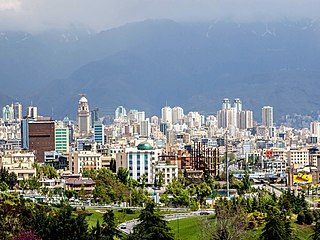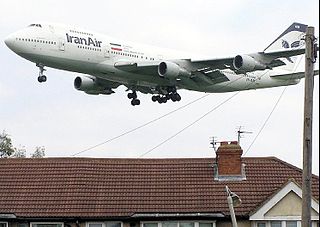
The economy of Iran is a mixed and transition economy with a large public sector. It is the world's eighteenth largest by purchasing power parity (PPP). Some 60% of the economy is centrally planned. It is dominated by oil and gas production, although over 40 industries are directly involved in the Tehran Stock Exchange, one of the best performing exchanges in the world over the past decade. With 10% of the world's proven oil reserves and 15% of its gas reserves, Iran is considered an "energy superpower."

The Office of Foreign Assets Control (OFAC) is a financial intelligence and enforcement agency of the U.S. Treasury Department. It administers and enforces economic and trade sanctions in support of U.S. national security and foreign policy objectives. Under Presidential national emergency powers, OFAC carries out its activities against foreign states as well as a variety of other organizations and individuals, like terrorist groups, deemed to be a threat to U.S. national security.

Iran and the United States have had no formal diplomatic relations since 1980. Pakistan serves as Iran's protecting power in the United States, while Switzerland serves as the United States' protecting power in Iran. Contacts are carried out through the Iranian Interests Section of the Pakistani Embassy in Washington, D.C., and the US Interests Section of the Swiss Embassy in Tehran. Iranian Supreme Leader Ali Khamenei banned direct talks with the United States in 2018.

Economic sanctions are commercial and financial penalties applied by one or more countries against a targeted self-governing state, group, or individual. Economic sanctions may include various forms of trade barriers, tariffs, and restrictions on financial transactions. An embargo is similar, but usually implies a more severe sanction often with a direct air and/or naval blockade. Economic sanctions generally aim to change the behavior of elites in the target country. However, the efficacy of sanctions is debatable and sanctions can have unintended consequences. Economic sanctions are not necessarily imposed because of economic circumstances—they may also be imposed for a variety of political, military, and social issues. Economic sanctions can be used for achieving domestic and international purposes.
The nuclear program of Iran has included several research sites, two uranium mines, a research reactor, and uranium processing facilities that include three known uranium enrichment plants. In 1970, Iran ratified the Non-Proliferation Treaty (NPT), making its nuclear program subject to the IAEA's verification.

Seyed Parviz Fattah is an Iranian conservative politician, former member of Revolutionary Guard and former minister of energy in Mahmoud Ahmadinejad's first cabinet from 2005 to 2009. He is currently head of Imam Khomeini Relief Foundation.
An arms embargo is a restriction or a set of sanctions that applies solely to weaponry, and may also apply to "dual-use technology". An arms embargo may serve one or more purposes:

The United States applies economic, trade, scientific and military sanctions against Iran. U.S. economic sanctions are administered by the U.S. Office of Foreign Assets Control. Currently, the U.S. sanctions against Iran include an embargo on dealings with the country by the U.S., and a ban on selling aircraft and repair parts to Iranian aviation companies.

Iranian-Swiss relations are foreign relations between the Islamic Republic of Iran and the Swiss Confederation.

Mark D. Wallace is an American businessman, former diplomat and lawyer who has served in a variety of government, political and private sector posts. He served in several positions during the administration of President George W. Bush, including as the United States Ambassador to the United Nations for UN Management and Reform.

The Iran and Libya Sanctions Act of 1996 (ILSA) was a 1996 act of the United States Congress that imposed economic sanctions on firms doing business with Iran and Libya. On September 20, 2004, the President signed an Executive Order to terminate the national emergency with respect to Libya and to end IEEPA-based economic sanctions on Libya. On September 30, 2006, the Act was renamed the Iran Sanctions Act (ISA). The Act was originally limited to five years, and has been extended several times. On December 1, 2016, ISA was extended for a further ten years.

The P5+1 refers to the UN Security Council's five permanent members ; namely China, France, Russia, the United Kingdom, and the United States; plus Germany. The P5+1 is often referred to as the E3+3 by European countries. It is a group of six world powers which, in 2006, joined together in diplomatic efforts with Iran with regard to its nuclear program.
The first sanctions against Iran were those imposed by the United States in November 1979 after a group of radical students seized the American Embassy in Tehran and took hostage the people inside. The sanctions by Executive Order 12170 included freezing about $12 billion in Iranian assets, including bank deposits, gold and other properties, and a trade embargo. These sanctions were lifted as part of the Algiers Accords which was a negotiated settlement of the hostages’ release.
Khatam al-Anbiya Construction Headquarter is an Iranian engineering firm controlled by the Iranian Revolutionary Guard Corps (IRGC). The firm, also known as GHORB, is the IRGC's major engineering arm and one of Iran's largest contractors in industrial and development projects. Khatam al-Anbiya was created during the 1980–88 Iran–Iraq War to help rebuild the country, and has diversified over the years into companies dealing with mechanical engineering, energy, mining and defense.

Tidewater Middle East Co. is a major port operator in Iran. In June 2011, the U.S. Department of Treasury sanctioned Tidewater for its alleged ownership by the Islamic Revolutionary Guard Corps (IRGC), which it says has used Tidewater for illicit weapons shipments.
The Makin Institute is a subsidiary of Khatam al-Anbia in Iran. It is blacklisted by the United States Department of the Treasury, the United Nations, and the European Union.
The Rahab Institute is a subsidiary of Khatam al-Anbia in Iran. It is blacklisted by the United States Department of the Treasury, the United Nations, and the European Union.
The Imensazen Consultant Engineers Institute (ICEI) is a subsidiary of Khatam al-Anbia in Iran. It is blacklisted by the United States Department of the Treasury.

The Joint Comprehensive Plan of Action, known commonly as the Iran nuclear deal or Iran deal, is an agreement on the Iranian nuclear program reached in Vienna on July 14, 2015, between Iran, the P5+1, and the European Union.
Iran Venezuela Bi-National Bank is an international financial institution that was founded in 2010 with an aim to develop commercial ties between Iran and Venezuela.















